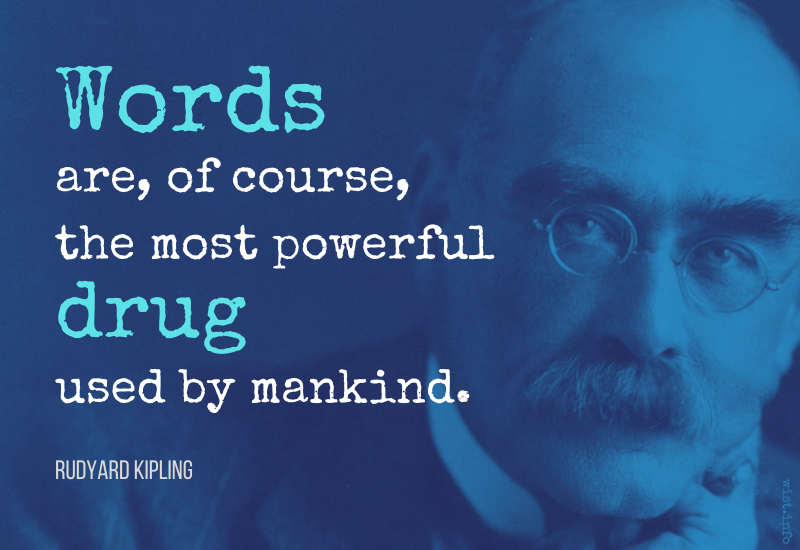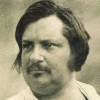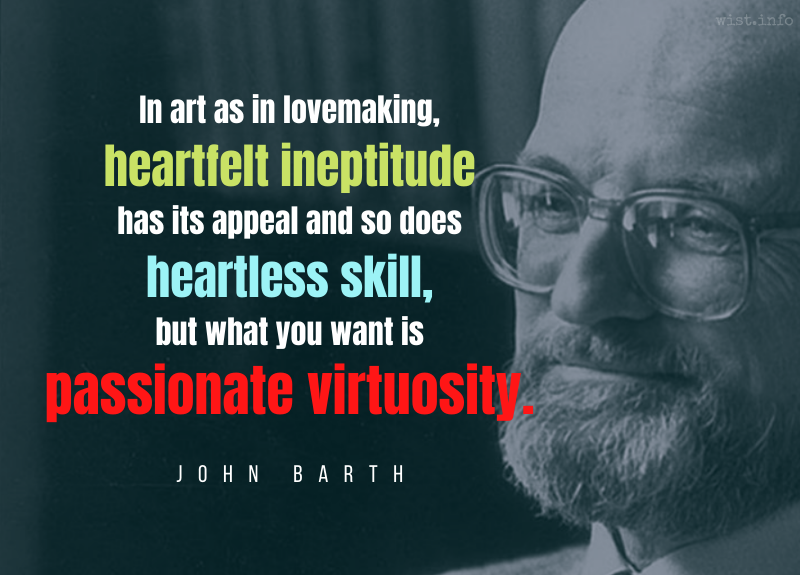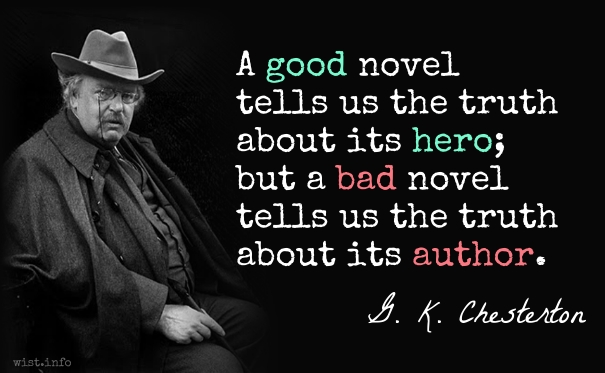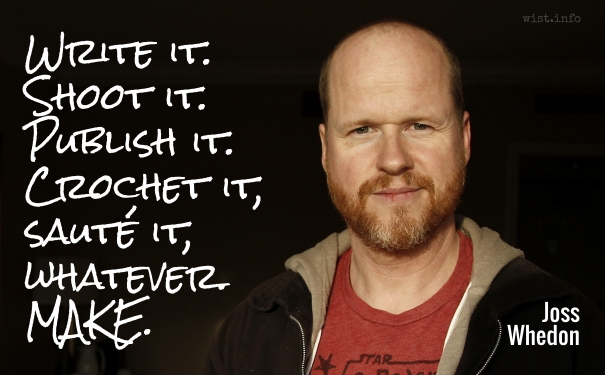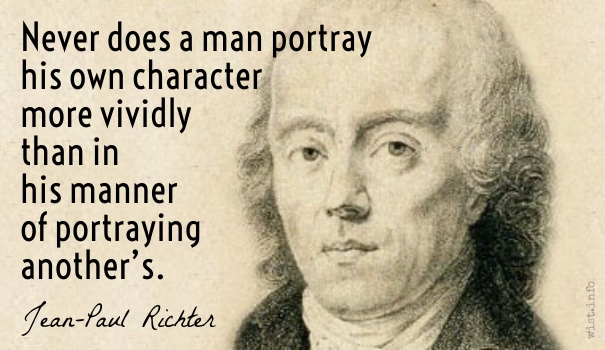There is something laughable about the sight of authors who enjoy the rustling folds of long and involved sentences: they are trying to cover up their feet.
[Man hat Etwas zum Lachen, diese Schriftsteller zu sehen, welche die faltigen Gewänder der Periode um sich rauschen machen: sie wollen so ihre Füsse verdecken.]
Friedrich Nietzsche (1844-1900) German philosopher and poet
The Gay Science [Die fröhliche Wissenschaft], Book 4, § 282 (1882) [tr. Kaufmann (1974)]
(Source)
Also known as La Gaya Scienza, The Joyful Wisdom, or The Joyous Science.
(Source (German)). Alternate translations:
It is something laughable to see those writers who make the folding robes of their periods rustle around them: they want to cover their feet.
[tr. Common (1911)]
There is something laughable about those writers who make the folded drapery of their period rustle around them; they want to hide their feet.
[tr. Hill (2018)]
Quotations about:
writer
Note not all quotations have been tagged, so Search may find additional quotes on this topic.
An old racetrack joke reminds you that your program contains all the winners’ names. I stare at my typewriter keys with the same thought.
Mignon McLaughlin (1913-1983) American journalist and author
The Neurotic’s Notebook, ch. 5 (1963)
(Source)
Cats are dangerous companions for writers because cat watching is a near-perfect method of writing avoidance.
Dan Greenburg (1936-2023) American writer, humorist, journalist
In Bill Hayward, Cat People (1978)
(Source)
When writers die they become books, which is, after all, not too bad an incarnation.
Writers do not live one life, they live two. There is the living and then there is the writing. There is the second tasting, the delayed reaction.
Books are the legacies that a great genius leaves to mankind, which are delivered down from generation to generation, as presents to the posterity of those who are yet unborn.
Joseph Addison (1672-1719) English essayist, poet, statesman
The Spectator #166 (1711-09-10)
(Source)
For of old
Rome said to me — “Your readers are your gold.
By them the stream of Lethe you’ll survive,
By them the better part of you will live.”
The wild fig splits Messalla’s marbles through,
And Crispus’ steeds are shattered quite in two :
But books are helped by time nor hurt by thieves,
Memorials that death uninjured leaves.[Quem cum mihi Roma dedisset.
“Nil tibi quod demus maius habemus” ait.
“Pigra per hunc fugies ingratae flumina Lethes
Et meliore tui parte superstes eris.
Marmora Messallae findit caprificus, et audax
Dimidios Crispi mulio ridet equos:
At chartis nec furta nocent et saecula prosunt,
Solaque non norunt haec monumenta mori.”]Martial (AD c.39-c.103) Spanish Roman poet, satirist, epigrammatist [Marcus Valerius Martialis]
Epigrams [Epigrammata], Book 10, epigram 2 (10.2) (AD 95, 98 ed.)[tr. Pott & Wright (1921)]
(Source)
(Source (Latin)). Alternate translations:
Reader, my wealth; whom when to me Rome gave,
Nought greater to bestow (quoth she) I have.
By him ingratefull Lethe thou shalt flye,
And in thy better part shalt never dye.
Wilde Fig-trees rend Messalla's Marbles off;
Crispus halfe-horses the bold Carters scoffe.
Writings no age can wrong, no thieving hand.
Deathlesse alone those Monuments will stand.
[tr. May (1629)]
When Fate to me a constant reader gave;
Receive, she said, the greatest boon I have.
By this beyond oblivion's stream arrive;
And in your better party by this survive.
Statues may moulder; and the clown unbred
Scoff at young Ammon's horse without his head.
But finish'd writings theft and time defy;
The only monument, which cannot die.
[tr. Hay (1755)]
Reader, our riches! Well, said, Rome, I know,
A blester boon I have not to bestow.
By this though thro' Lethean streams shalt strive,
And in thy better part shalt still survive.
The wilding may Messala's marble cleave,
The speaker silence, and the sculptor reave.
The mule's pert driver may reproachless laugh,
At Crispus' coursers dwindled down to half.
Wit's labors onely rape or age defy:
His monuments alone can never die.
[tr. Elphinston (1782)]
When Rome gave you [readers] to me, she said, "I have nothing greater to give you. By his means you will escape the sluggish waves of ungrateful Lethe, and will survive in the better part of yourself. The marble tomb of Messale is split by the wild fig, and the audacious muleteer laughs at the mutilated horses of the statue of Crispus.1 But as for writings, they are indestructible either by thieves or the ravages of time; such monuments alone are proof against death."
[tr. Bohn's Classical (1859)]
For when Rome had given you to me, she said: We have nothing greater to give you. By him will you escape unthankful Lethe's sluggish stream, and will in your better part survive. Messalla's marble the wild-fig sunders, and boldly the mule-driver laughs at Crispus' steeds broken in two. But writings thefts do not injure, and time befriends them, and alone these monuments know not death."
[tr. Ker (1919)]
Rome can tell how dear,
Who gave thee, saying, "Take my best; 'tis here;
By him ungrateful Lethe thou shallt flee
And thy best parts have immortality."
The fig-tree splits Messala's marble blocks,
And the rough drover draggled Crispus mocks.
Verses grow great with Time and Fate defy;
Such monuments alone can never die.
[tr. Francis & Tatum (1924), ep. 508]
When Rome gave you to me, she said: "I have nothing greater to give you. through him you will escape ungrateful Lethe's idle waters and survive in the better part of yourself. The fig tree splits Messalla's marble, the bold muleteer laughs at Crispus' halved horses. But thefts do not harm paper and the centuries do it good. These are the only memorials that cannot die."
[tr. Shackleton Bailey (1993)]
Reader, Patron, willed to me by Rome
saying: "No greater gift! Through him
You'll flee neglectful Lethe's stagnant flood --
the better part of you survive.
Wild-fig rives the marble, heedless muleteers
deride the busted steeds of bronze.
But verse no decrease knows, time adds to verse,
deathless alone of monuments."
[tr. Whigham (1985), "Rome's Gift"]
The aim of every artist is to arrest motion, which is life, by artificial means and hold it fixed so that a hundred years later, when a stranger looks at it, it moves again since it is life. Since man is mortal, the only immortality possible for him is to leave something behind him that is immortal since it will always move. This is the artist’s way of scribbling “Kilroy was here” on the wall of the final and irrevocable oblivion through which he must someday pass.
William Faulkner (1897-1962) American novelist
“The Art of Fiction,” Interview by Jean Stein, Paris Review #12 (Spring 1956)
(Source)
When a poet is being a poet — that is, when he is writing or thinking about writing — he cannot be concerned with anything but the making of a poem. If the poem is to turn out well, the poet cannot have thought of whether it will be saleable, or of what its effect on the world should be; he cannot think of whether it will bring him honor, or advance a cause, or comfort someone in sorrow. All such considerations, whether silly or generous, would be merely intrusive; for, psychologically speaking, the end of writing is the poem itself.
Though so lengthy a book should your taste satisfy,
You have asked me for more: but my household will cry
For some food, and the usurer’s drained me quite dry;
So reader … you see what I mean to imply?
You are silent and don’t understand me? Good bye![Quamvis tam longo possis satur esse libello,
Lector, adhuc a me disticha pauca petis.
Sed Lupus usuram puerique diaria poscunt.
Lector, solve. Taces dissimulasque? Vale.]Martial (AD c.39-c.103) Spanish Roman poet, satirist, epigrammatist [Marcus Valerius Martialis]
Epigrams [Epigrammata], Book 11, epigram 108 (11.108) (AD 96) [tr. Pott & Wright (1921), “A Hint”]
(Source)
"To the Reader." (Source (Latin)). Alternate translations:
With my long book thou well may'st glutted be,
Yet thou more epigrams exact'st of me:
But Lupus calls for use, servants for pay,
Discharge them, reader. Now thou'st nought to say,
Dissemblest, as my words thou could'st not spell.
No riddle thou'rt to me, reader, farewell.
[tr. Killigrew (1695)]
Although, reader, you may well be tired of so long a book, you still want a few more distichs from me. But Lupus demands his interest; and my copyists their wages. Pay, reader. You are silent; do you pretend not to hear? Then, goodbye.
[tr. Bohn's Classical (1859)]
Although with so long a book you may well be sated, reader, yiou still ask for a few distichs from me. But Lupus requires his interest, and my slaves their rations. Reader, pay me. Do you say nothing, and pretend yuo don't understand? Good bye!
[tr. Ker (1919)]
Contented reader -- I had thought to say,
But something's wanting? Then perhaps you'll pay.
My bailiff's broke, my lads for victuals cry;
What? Silent? Can't afford it? Then good-bye.
[tr. Francis & Tatum (1924), ep. 639, "A Postscript"]
I should have thought you'd had your fill
By now -- this book's too long -- yet still
You clamour for couplets. You forget,
My slaves need rations, I'm in debt,
The interest's due ... Dear reader, pay
My creditors for me. Silent, eh?
The puzzled innocent? Good-day!
[tr. Michie (1972)]
Reader, although you might well be satisfied with so long a little book, you ask me for a few couplets more. But Lupus demands his interest and the boys their rations. Pay up, reader. You say nothing and pretend not to hear? Good-bye.
[tr. Shackleton Bailey (1993)]
Reader, so long a book should satisfy you,
yet still "a few more couplets," you reply.
But boys want food and Lupus wants his interest.
Pay up! You're silent, playing deaf? Goodbye.
[tr. McLean (2014)]
A little book this long could satisfy your appetite, reader, but still you ask me for a few couplets more; but Lupus wants his interest, and my boys, their rations. Reader, clear my slate. Nothing to say? Pretending you're deaf? Get lost!
[tr. Nisbet (2015)]
All writers are born; they’re never made … I take off and write, out of a sense of desperate compulsion. I always write as if I’d gotten my X-ray back from the doctor on Monday, and I’d best check with the insurance man to see whether or not the house is free and clear.
Rod Serling (1924-1975) American screenwriter, playwright, television producer, narrator
Lecture notes, Creativity Seminar, Ithaca College (c. 1972)
(Source)
I believe that man will not merely endure: he will prevail. He is immortal, not because he alone among creatures has an inexhaustible voice, but because he has a soul, a spirit capable of compassion and sacrifice and endurance. The poet’s, the writer’s, duty is to write about these things. It is his privilege to help man endure by lifting his heart, by reminding him of the courage and honor and hope and pride and compassion and pity and sacrifice which have been the glory of his past. The poet’s voice need not merely be the record of man, it can be one of the props, the pillars to help him endure and prevail.
William Faulkner (1897-1962) American novelist
Speech, Nobel Banquet, Stockholm (1950-12-10)
(Source)
Faulkner received the 1949 Nobel Prize for Literature.
You see we make our writers into something very strange. […] We destroy them in many ways. First, economically. They make money. It is only by hazard that a writer makes money although good books always make money eventually. Then our writers when they have made some money increase their style of living and are caught. They have to write to keep up their establishment, their wives, and so on, and they write slop. It is slop not on purpose but because it is hurried. Because they are ambitious. Then, once they have betrayed themselves, they justify it and you get more slop. Or else they read the critics. If they believe the critics when they say they are great then they must believe them when they say they are rotten and they lose confidence. At present we have two good writers who cannot write because they have lost confidence through reading the critics. If they wrote, sometimes it would be good and sometimes not so good and sometimes it would be quite bad, but the good would get out. But they have read the critics, and they must write masterpieces. The masterpieces the critics said they wrote. They weren’t masterpieces, of course. They were just quite good books. So now they cannot write at all. The critics have made them impotent.
Ernest Hemingway (1899-1961) American writer
Green Hills of Africa, ch. 1 (1935)
(Source)
Speaking of American writers.
Popular success is a palace built for a writer by publishers, journalists, admirers and professional reputation makers, in which a silent army of termites, rats, dry rot and death-watch beetles are tunnelling away, till, at the very moment of completion, it is ready to fall down. The one hope for a writer is that although his enemies are often unseen they are seldom unheard. He must listen for the death-watch, listen for the faint toc-toc, the critic’s truth sharpened by envy, the embarrassed praise of a sincere friend, the silence of gifted contemporaries, the implications of the don in the manger, the visitor in the small hours. He must dismiss the builders and contractors, elude the fans with an assumed name and dark glasses, force his way off the moving staircase, subject every thing he writes to a supreme critical court. Would it amuse Horace or Milton or Swift or Leopardi? Could it be read to Flaubert? Would it be chosen by the Infallible Worm, by the discriminating palates of the dead?
Cyril Connolly (1903-1974) English intellectual, literary critic and writer.
Enemies of Promise, Part 2, ch. 15 “The Slimy Mallows” (1938)
(Source)
Whom the gods wish to destroy, they first call promising. Young writers if they are to mature require a period of between three and seven years in which to live down their promise. Promise is like the mediaeval hangman who after settling the noose, pushed his victim off the platform and jumped on his back, his weight acting a drop while his jockeying arms prevented the unfortunate from loosening the rope. When he judged him dead he dropped to the ground.
Cyril Connolly (1903-1974) English intellectual, literary critic and writer.
Enemies of Promise, Part 2, ch. 13 “The Poppies” (1938)
(Source)
In the verse Cinna writes
I am slandered, it’s said.
But the man doesn’t write
Whose verses aren’t read.[Versiculos in me narratur scribere Cinna.
Non scribit, cuius carmina nemo legit.]Martial (AD c.39-c.103) Spanish Roman poet, satirist, epigrammatist [Marcus Valerius Martialis]
Epigrams [Epigrammata], Book 3, epigram 9 (3.9) (AD 87-88) [tr. Nixon (1911)]
"On Cinna." (Source (Latin)). Alternate translations:
Cinna writes verses against me, 'tis said:
He writes not, whose bad verse no man doth read.
[tr. Fletcher (c. 1650)]
Against me Cinna, as I hear, indites;
Since none him reads, who can affirm he writes?
[tr. Killigrew (1695)]
Cinna's verse upon me, they say, keenly procedes.
He's beli'd: for he writes not, whom nobody reads.
[tr. Elphinston (1782). 12.23]
Jack writes severe lampoons on me, 'tis said
----But he writes nothing, who is never read.
[tr. Hodgson (c. 1810)]
Cinna, I am told, is a writer of small squibs against me. A man cannot be called a writer, whose effusions no one reads.
[tr. Bohn's Classical (1859)]
Cinna, they say, 'gainst me is writing verses:
He can't be said to write whom no one reads.
[ed. Harbottle (1897)]
Cinna is said to write verses against me. He doesn't write at all whose poems no man reads.
[tr. Ker (1919)]
He publishes lampoons on me, 'tis said;
How can he publish who is never read?
[tr. Pott & Wright (1921)]
Cinna writes poems against me? He has no readers,
so how can they say that he's a writer?
[tr. Bovie (1970)]
Cinna is reported to write verses against me. Nobody writes, whose poems nobody reads.
[tr. Shackleton Bailey (1993)]
Cinna, a writer, attacks me with screeds.
But he's not a writer whom nobody reads.
[tr. Ericsson (1995)]
They say Cinna writes little poems about me.
He’s no writer, whose verse nobody reads.
[tr. Kline (2006), "A Silent Critic"]
His verse was meant to strike me low,
But since he wrote it -- who will know?
[tr. Wills (2007)]
I hear Cinna has written some verses against me.
A man is no writer
if his poems have no reader.
[tr. Kennelly (2008)]
Cinna, they say, writes verse attacking me.
He doesn’t write, whose verses none will see.
[tr. McLean (2014)]
They say Cinna is writing epigrams and I'm his target. He's not "writing" if no one's reading him.
[tr. Nisbet (2015)]
They say that Cinna slams
me in his epigrams.
A poem no one has heard
has really not occurred.
[tr. Juster (2016)]
Cinna attacks me, calls me dirt?
Let him. Who isn't read, can't hurt.
[tr. O'Connell]
An author, like any other so-called artist, is a man in whom the normal vanity of all men is so vastly exaggerated that he finds it a sheer impossibility to hold it in. His overpowering impulse is to gyrate before his fellow men, flapping his wings and emitting defiant yells. This being forbidden by the police of all civilized countries, he takes it out by putting his yells on paper. Such is the thing called self-expression.
H. L. Mencken (1880-1956) American writer and journalist [Henry Lewis Mencken]
“The Fringes of Lovely Letters,” Prejudices: Fifth Series (1926)
(Source)
It is advantageous to an author, that his book should be attacked as well as praised. Fame is a shuttlecock. If it be struck at one end of the room, it will soon fall to the ground. To keep it up, it must be struck at both ends.
Samuel Johnson (1709-1784) English writer, lexicographer, critic
Comment (11-19 Nov 1793), in James Boswell, Journey of a Tour to the Hebrides (1785)
(Source)
A transition from an author’s book to his conversation is too often like an entrance into a large city after a distant prospect. Remotely, we see nothing but spires of temples, and turrets of palaces, and imagine it the residence of splendor, grandeur, and magnificence; but when we have passed the gates, we find it perplexed with narrow passages, disgraced with despicable cottages, embarrassed with obstructions, and clouded with smoke.
Samuel Johnson (1709-1784) English writer, lexicographer, critic
The Rambler, #14 (5 May 1784)
(Source)
A sick man that gets talking about himself, a woman that gets talking about her baby, and an author that begins reading out of his own book, never know when to stop.
Oliver Wendell Holmes, Sr. (1809-1894) American poet, essayist, scholar
The Poet at the Breakfast-Table, ch. 11 (1872)
(Source)
I am, by calling, a dealer in words; and words are, of course, the most powerful drug used by mankind.
Rudyard Kipling (1865-1936) English writer
“Surgeons and the Soul,” speech, Royal College of Surgeons (14 Feb 1923)
(Source)
A catless writer is almost inconceivable. It’s a perverse taste, really, since it would be easier to write with a herd of buffalo in the room than even one cat; they make nests in the notes and bite the end of the pen and walk on the typewriter keys.
But the problem is that bad writers tend to have the self-confidence, while the good ones tend to have self-doubt.
Charles Bukowski (1920-1994) German-American author, poet
“Charles Bukowski,” interview by Alden Mills, Arete (Jul/Aug 1989)
This is almost always misquoted in a much broader paraphrase, e.g., "The problem with the world is that the intelligent people are full of doubts, while the stupid ones are full of confidence," perhaps to echo Russell and Yeats.
More examination of this quotation: The Best Lack All Conviction While the Worst Are Full of Passionate Intensity – Quote Investigator.
Every work of art is one half of a secret handshake, a challenge that seeks the password, a heliograph flashed from a tower window, an act of hopeless optimism in the service of bottomless longing. Every great novel or comic book convenes the first meeting of a fan club whose membership stands forever at one but which maintains chapters in every city — in every cranium — in the world. Art, like fandom, asserts the possibility of fellowship in a world built entirely from the materials of solitude.
Don’t ask a writer what he’s working on. It’s like asking someone with cancer about the progress of his disease.
Jay McInerney (b. 1955) American novelist, screenwriter, editor [John Barrett McInerney, Jr.]
Brightness Falls, ch. 1 (1985)
(Source)
So long as you write what you wish to write, that is all that matters; and whether it matters for ages or only for hours, nobody can say.
Virginia Woolf (1882-1941) English modernist writer [b. Adeline Virginia Stephen]
“A Room of One’s Own,” ch. 6 (1929)
(Source)
I have regarded you, not as a novelist, but as an historian; for it is my considered opinion, unshaken at 85, that records of fact are not history. They are only annals, which cannot become historical until the artist-poet-philosopher rescues them from the unintelligible chaos of their actual occurrence and arranges them in works of art.
When people ask me what has happened in my long lifetime I do not refer them to the newspaper files and to the authorities, but to your novels. They object that the people in your books never existed; that their deeds were never done and their sayings never uttered. I assure them that they were, except that Upton Sinclair individualized and expressed them better than they could have done, and arranged their experiences, which as they actually occurred were as unintelligible as pied type, in significant and intelligible order.
Most artists, ashamed of their need for encouragement, try to carry their work to term like a secret pregnancy. … We bunker in with our projects, beleaguered by our loneliness and the terrible secret that we carry: We need friends to our art. We need them as desperately as friends to our hearts. Our projects, after all, are our brainchildren, and what they crave is a loving extended family, a place where “How’d it go today?” can refer to a turn at the keys or the easel as easily as a turn in the teller’s cage.”
Julia Cameron (b. 1948) American teacher, author, filmmaker, journalist
“Taking Heart,” The Sound of Paper (2005)
(Source)
To be a writer is to accept failure as a profession — which of us is Dante or Shakespeare? — and could they return, wouldn’t they fall at once to revising, knowing they could make the work better? In our own dwarfed way, we are trying for something like perfection, knowing it is unachievable (except of course that trying and failing is a better way of living than not trying).
John Ciardi (1916-1986) American poet, writer, critic
In Vince Clemente, “‘A Man Is What He Does With His Attention’: A Conversation with John Ciardi,” Poesis, Vol. 7 #2 (1986)
(Source)
The writer, like a swimmer caught by an undertow, is borne in an unexpected direction. He is carried to a subject which has awaited him — a subject sometimes no part of his conscious plan. Reality, the reality of sensation, has accumulated where it was least sought. To write is to be captured — captured by some experience to which one may have given hardly a thought.
An artist is a creature driven by demons. He doesn’t know why they chose him and he’s usually too busy to wonder why. He is completely amoral in that he will rob, borrow, beg, or steal from anybody and everybody to get the work done.
William Faulkner (1897-1962) American novelist
“The Art of Fiction,” Interview by Jean Stein, Paris Review #12 (Spring 1956)
(Source)
If the artist does not throw himself into his work as Curtius sprang into the gulf, as a soldier leads a forlorn hope without a moment’s thought, and if when he is in the crater he does not dig as a miner does when the earth has fallen in on him; if he contemplates the difficulties before him instead of conquering them one by one, like the lovers in fairy tales, who to win their princesses overcome ever-new enchantments, the work remains incomplete; it perishes in the studio where creativeness becomes impossible, and the artist looks on the suicide of his own talent.
[Si l’artiste ne se précipite pas dans son oeuvre, comme Curtius dans le gouffre, comme le soldat dans la redoute, sans réfléchir; et si, sans ce cratère, il ne travaille pas comme le mineur enfoui sous un éboulement: s’il contemple enfin les difficultés au lieu de las vaincre une à une, à l’example de ces amoureux des féeries, qui pour obtenir leurs princesses, combattaient des enchantements renaissants, l’oeuvre reste inachevée, elle périt au fond de l’atelier où la production devient impossible, et l’artiste assiste au suicide de son talent.]
Honoré de Balzac (1799-1850) French novelist, playwright
Cousin Betty [La Cousine Bette] (1846) [tr. Waring (1899)]
(Source)
Curtius is the young Roman patrician, Marcus Curtius. In 362 BC, a chasm opened up in Rome's forum, and soothsayers proclaimed it could only be filled by Rome's greatest treasure. Curtius mounted his horse and leapt into the chasm, which then closed over him.
Alt. trans.:
- "If the artist does not throw himself into his work, like Curtius into the gulf beneath the Forum, like a soldier against a fortress, without hesitation, and if, in that crater, he does not work like a miner under a fall of rock, if, in short, he envisages the difficulties instead of conquering them one-by-one, following the examples of lovers in fairy-tales who, to win their princesses, struggle against recurring enchantments, the work remains unfinished, it expires in the studio, wher production remains impossible and the artist looks on at the suicide of his own talent." [tr. Raphael (1992)]
- "If the artist does not fling himself, without reflecting, into his work, as Curtius flung himself into the yawning gulf, as the soldier flings himself into the enemy's trenches, and if, once in this crater, he does not work like a miner on whom the walls of his gallery have fallen in; if he contemplates difficulties instead of overcoming them one by one ... he is simply looking on at the suicide of his own talent." [Source]
- Original French.
PHILINTE: A gentleman may be respected still,
Whether he writes a sonnet well or ill.
That I dislike his verse should not offend him;
In all that touches honor, I commend him;
He’s noble, brave, and virtuous — but I fear
He can’t in truth be called a sonneteer.”On peut être honnête homme, et faire mal des vers,
Ce n’est point à l’honneur que touchent ces matières,
Je le tiens galant homme en toutes les manières,
Homme de qualité, de mérite et de cœur,
Tout ce qu’il vous plaira, mais fort méchant auteur.Molière (1622-1673) French playwright, actor [stage name for Jean-Baptiste Poquelin]
Le Misanthrope, Act 4, sc. 1, ll. 1144-48 (1666) [tr. Wilbur (1954)]
(Source)
Alt. trans.:
- "A man can be a gentleman and make bad verses. Such matters do not touch his honor, and I hold him to be a gallant man in every other way; a man of quality, of courage, deserving of anything you please, but -- a bad writer." [tr. Wormeley (1894)]
- "A man may be / A perfect gentleman, and write poor verse. / These matters do not raise the point of honor. / I hold him a true man in all respects, / Brave, worthy, noble, anything you will, / But still, a wretched writer." [tr. Page (1913)]
- "Anyone may be an honorable man, and yet write verse badly." [Bartlett]
TANNER: The true artist will let his wife starve, his children go barefoot, his mother drudge for his living at seventy, sooner than work at anything but his art.
George Bernard Shaw (1856-1950) British playwright and critic
Man and Superman, Act 1 (1903)
(Source)
My feeling about technique in art is that it has about the same value as technique in love-making. That is to say, on the one hand, heartfelt ineptitude has its appeal and, on the other hand, so does heartless skill; but what you want is passionate virtuosity.
John Barth (b. 1930) American writer
“An Interview with John Barth,” by Alan Prince and Ian Carruthers, Prism (Spring 1968)
(Source)
The quotation from the interview (originally credited only to Prince) was also included in the inside dust cover of Barth's short story collection, Lost in the Funhouse (1968), and is sometimes cited to that book.
The longer quote was paraphrased to the form in the graphic above on the dust cover of Charles B. Harris, Passionate Virtuosity: The Fiction of John Barth (1983):
In art as in lovemaking, heartfelt ineptitude has its appeal and so does heartless skill, but what you want is passionate virtuosity.
Harris later gives the full quotation inside his book.
Also used by Barth in "Dunyazadiad," Esquire (1972-07-01), reprinted in Chimera (1972):
Heartfelt ineptitude has its appeal, Dunyazade; so does heartless skill. But what you want is passionate virtuosity.
I never saw an author in my life — saving perhaps one — that did not purr as audibly as a full-grown domestic cat on having his fur smoothed the right way by a skillful hand.
H.G. Wells said that history was a race between education and catastrophe, and it may be that the writer will add just sufficient impetus to education to enable it to outrace catastrophe. And if education wins by even the narrowest of margins, how much more can we ask for?
A real writer learns from earlier writers the way a boy learns from an apple orchard — by stealing what he has a taste for and can carry off.
Archibald MacLeish (1892–1982) American poet, writer, statesman
In Charles Poore, “Mr. MacLeish and the Disenchantmentarians,” The New York Times (25 Jan 1968)
(Source)
I’m convinced if I keep going one day I will write something decent. On very bad days I will observe that I must have written good things in the past, which means that I’ve lost it. But normally I just assume that I don’t have it. The gulf between the thing I set out to make in my head and the sad, lumpy thing that emerges into reality is huge and distant and I just wish that I could get them closer.
Neil Gaiman (b. 1960) British author, screenwriter, fabulist
“This Much I Know,” The Guardian (2017-08-05)
(Source)
There’s nothing like studying the bestseller lists of bygone years for teaching an author humility. You’ve heard of the ones that got filmed, normally. Mostly you realize that today’s bestsellers are tomorrow’s forgotten things.
Neil Gaiman (b. 1960) British author, screenwriter, fabulist
“This Much I Know,” The Guardian (2017-08-05)
(Source)
The writer … when he’s rejected, that paper is rejected, in a sense, a sizable fragment of the writer is rejected as well. It’s a piece of himself that’s being turned down. And how often can this happen before suddenly you begin to question your own worth and your own value? And even worse, fundamentally, your own talent?
Rod Serling (1924-1975) American screenwriter, playwright, television producer, narrator
“Rod Serling: The Facts of Life,” Interview with Linda Brevelle (4 Mar 1975)
(Source)
I suppose we think euphemistically that all writers write because they have something to say that is truthful and honest and pointed and important. And I suppose I subscribe to that, too. But God knows when I look back over thirty years of professional writing, I’m hard-pressed to come up with anything that’s important. Some things are literate, some things are interesting, some things are classy, but very damn little is important.
Rod Serling (1924-1975) American screenwriter, playwright, television producer, narrator
“Rod Serling: The Facts of Life,” interview by Linda Brevelle (4 Mar 1975)
(Source)
The writer’s role is to menace the public’s conscience. He must have a position, a point of view. He must see the arts as a vehicle of social criticism and he must focus on the issues of his time.
A good novel tells us the truth about its hero; but a bad novel tells us the truth about its author.
Gilbert Keith Chesterton (1874-1936) English journalist and writer
Heretics, ch. 15 “On Smart Novelists and the Smart Set” (1905)
(Source)
If you have a good idea, get it out there. For every idea I’ve realized, I have ten I sat on for a decade till someone else did it first. Write it. Shoot it. Publish it. Crochet it, sauté it, whatever. MAKE.
Joss Whedon (b. 1964) American screenwriter, author, producer [Joseph Hill Whedon]
“Dollhouse’s Joss Whedon Answers Your Questions,” Hulu Blog (9 Mar 2009)
(Source)
Fortune has dealt with me rather too well. I have known little struggle, not much poverty, many generosities. Now and then I have, for my books or myself, been somewhat warmly denounced — there was one good pastor in California who upon reading my Elmer Gantry desired to lead a mob and lynch me, while another holy man in the state of Maine wondered if there was no respectable and righteous way of putting me in jail. And, much harder to endure than any raging condemnation, a certain number of old acquaintances among journalists, what in the galloping American slang we call the “I Knew Him When Club,” have scribbled that since they know me personally, therefore I must be a rather low sort of fellow and certainly no writer. But if I have now and then received such cheering brickbats, still I, who have heaved a good many bricks myself, would be fatuous not to expect a fair number in return.
Journalism is a good place for any writer to start — the retelling of fact is always a useful trade and can it help you learn to appreciate the declarative sentence. A young writer is easily tempted by the allusive and ethereal and ironic and reflective, but the declarative is at the bottom of most good writing.
JOYCE: An artist is the magician put among men to gratify — capriciously — their urge for immortality. The temples are built and brought down around him, continuously and contiguously, from Troy to the fields of Flanders. If there is any meaning in any of it, it is in what survives as art, yes even in the celebration of tyrants, yes even in the celebration of nonentities. What now of the Trojan War if it had been passed over by the artist’s touch? Dust. A forgotten expedition prompted by Greek merchants looking for new markets. A minor redistribution of broken pots. But it is we who stand enriched, by a tale of heroes, of a golden apple, a wooden horse, a face that launched a thousand ships —– and above all, of Ulysses, the wanderer, the most human, the most complete of all heroes — husband, father, son, lover, farmer, soldier, pacifist, politician, inventor and adventurer.
Every secret of a writer’s soul, every experience of his life, every quality of his mind, is written large in his works.
Virginia Woolf (1882-1941) English modernist writer [b. Adeline Virginia Stephen]
Orlando: A Biography, ch. 4 (1928)
(Source)
















